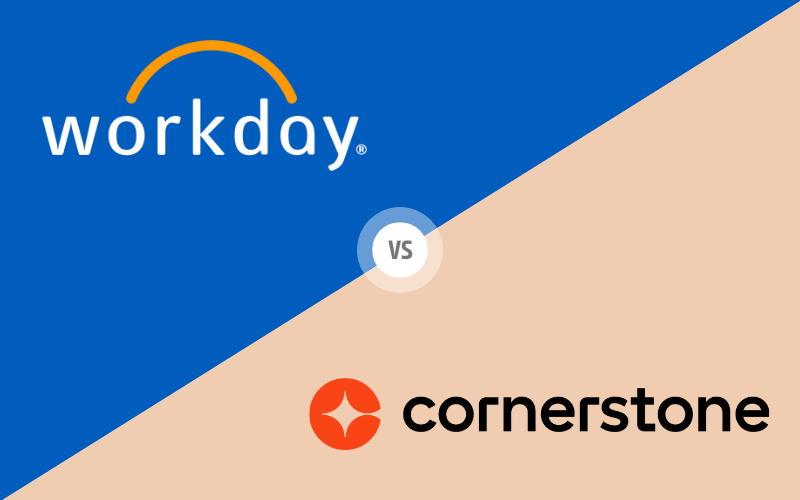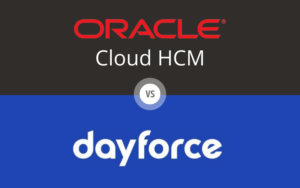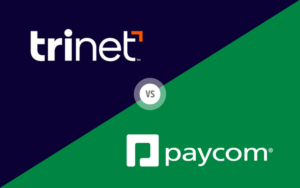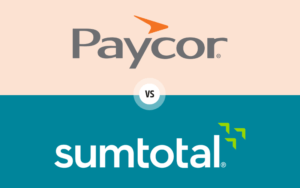When it comes to choosing between Workday vs Cornerstone, organizations face a crucial decision that can significantly impact their Human Capital Management (HCM) strategy. Both platforms are highly regarded in the industry, offering a range of features designed to streamline HR processes, enhance employee development, and ensure compliance. In this blog post, we’ll compare Workday and Cornerstone across several key areas, including user experience, core HR functions, payroll management, talent management, and more, to help you determine which solution best fits your organization’s needs.
Table of Contents
User Interface and User Experience
When evaluating the user interface (UI) and user experience (UX) of Workday versus Cornerstone, it’s essential to understand how each platform caters to its users through design, functionality, and overall ease of use. Both systems aim to streamline HR tasks with their unique interfaces, but their approaches offer distinct experiences suited for different organizational needs.

Workday User Interface and User Experience
Workday presents a modern, intuitive interface that is both clean and user-friendly, designed to cater to organizations with varying levels of complexity. The platform is well-known for its customizable dashboard, enabling HR teams to configure the layout to align closely with their specific workflows. This level of personalization enhances user engagement and productivity by ensuring that users can quickly access the tools and information they use most frequently.
Key Features of Workday UI/UX:
- Customization: Workday allows extensive personalization of dashboards and workflows to meet specific organizational needs.
- Ease of Navigation: The interface is straightforward with clearly labeled menus and logical structures, minimizing the learning curve for new users.
- Mobile Accessibility: The mobile app offers a seamless experience that mirrors the desktop interface, allowing users to perform key tasks on the go.
- Visual Appeal: Workday’s design is modern and visually appealing, contributing to a positive user experience.
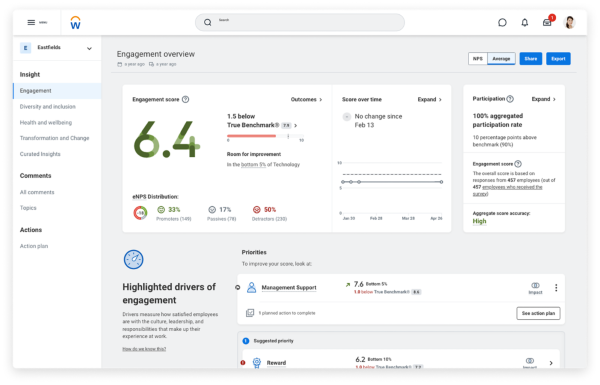
While Workday’s interface is designed to be intuitive, some users may find that the extensive customization options require time to fully leverage, especially in larger organizations where workflows can be more complex. Recent updates have further refined the UI, enhancing usability and responsiveness[1].
Cornerstone User Interface and User Experience
Cornerstone offers a streamlined UI focused on functionality, particularly in the areas of learning and talent management. The platform is designed to be user-friendly, with a clean interface that supports the efficient completion of HR tasks. Although Cornerstone’s customization options are not as extensive as Workday’s, its interface is well-organized, making it easy for users to navigate.
Key Features of Cornerstone UI/UX:
- Streamlined Design: The interface minimizes clutter, ensuring that users can easily find and access necessary tools.
- Learning-Centric Layout: The platform’s interface is optimized for quick access to training modules, course management, and performance tracking, making it particularly effective for learning and development purposes.
- Efficiency: Cornerstone emphasizes reducing the number of clicks needed to perform tasks, enhancing overall efficiency.
- Integration with HR Tools: The UI facilitates smooth integration with other HR tools, providing a cohesive user experience across different platforms.
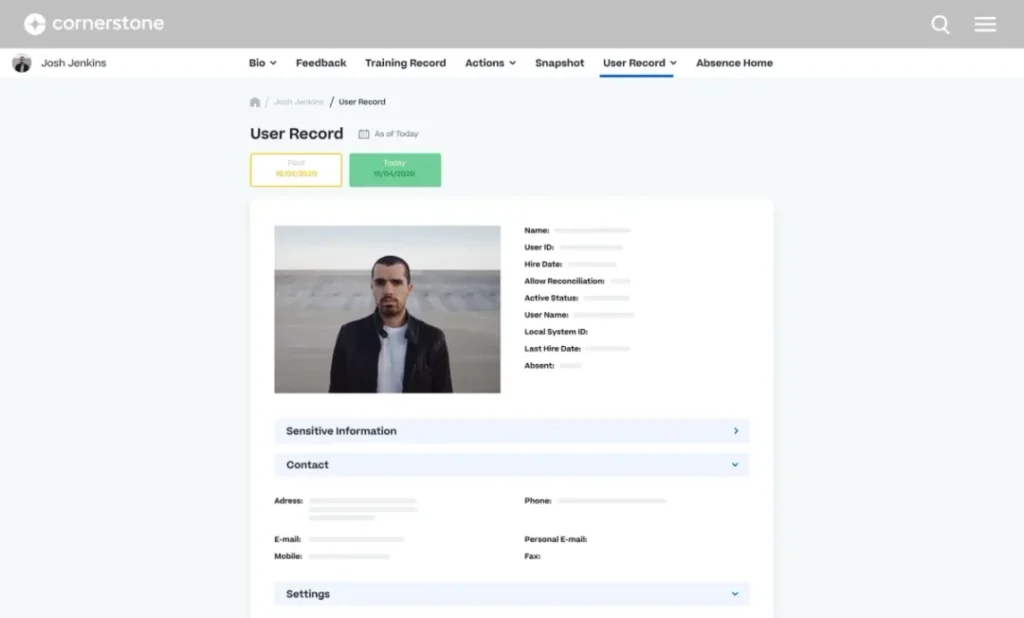
Cornerstone’s approach to UI and UX is particularly beneficial for organizations that prioritize learning and talent management. However, some users may find the lack of extensive customization a limitation compared to other platforms. Recent enhancements have improved the overall user experience, making it even more intuitive[2].
Comparison and Conclusion
Choosing between Workday and Cornerstone for user interface and user experience requires a deep understanding of your organization’s needs, resources, and priorities.
Workday excels in providing a highly customizable and user-friendly interface, making it an excellent choice for organizations that require flexibility and need to tailor their HR workflows extensively. Its modern design and seamless mobile accessibility ensure that users can perform tasks efficiently, whether in the office or on the go.
Cornerstone offers a more streamlined, learning-focused interface that is ideal for organizations that emphasize talent development and training. Its efficient design and learning-centric layout make it a strong choice for companies where quick adoption and straightforward processes are critical.
Both systems provide robust capabilities, but the decision between Workday and Cornerstone will depend on whether your organization values extensive customization and flexibility or streamlined functionality focused on learning and talent management.
In summary
- Workday is suited for organizations needing a customizable and flexible interface that supports a wide range of HR functions. Its intuitive design and mobile accessibility make it a versatile option for diverse business environments.
- Cornerstone is ideal for organizations prioritizing ease of use and efficiency in learning and development. Its streamlined design supports quick adoption and effective management of HR tasks.
Ultimately, the choice between Workday and Cornerstone depends on your organizational scale, the complexity of your HR needs, and your preference for customization versus efficiency in learning and development. By carefully evaluating these factors, you can select the platform that will best support your HR strategy, enhance productivity, and meet your specific requirements. This decision will significantly impact how effectively your HR team operates and how well the system is adopted across your organization, driving overall business success.
Core HR Functions
When evaluating the core HR functions of Workday versus Cornerstone, it’s essential to understand how each platform supports the fundamental HR operations crucial for managing your workforce. Both Workday and Cornerstone offer comprehensive HR capabilities, but their approaches cater to different organizational needs.

Workday Core HR Functions
Workday is renowned for its robust core HR functionality, designed to support organizations of all sizes, particularly those with complex HR needs. The platform’s core HR functions are built on a unified system that integrates seamlessly with other modules, ensuring consistent data management across the entire HR spectrum.
Key Features of Workday Core HR Functions:
- Comprehensive Employee Lifecycle Management: Workday provides tools to manage every stage of the employee lifecycle, from recruitment to retirement, ensuring that all HR processes are streamlined and efficient.
- Global Compliance and Localization: Workday supports a global workforce with features that ensure compliance with local labor laws and regulations, making it suitable for multinational companies.
- Employee Self-Service: The platform empowers employees with self-service capabilities, allowing them to manage personal information, benefits, and payroll details independently, reducing administrative burdens on HR teams.
- Advanced Workforce Analytics: Workday’s analytics tools offer deep insights into workforce trends, helping HR teams make data-driven decisions that align with organizational goals.
- Unified HR Platform: All core HR functions are integrated within a single platform, ensuring consistency and reducing the complexity of managing multiple systems.
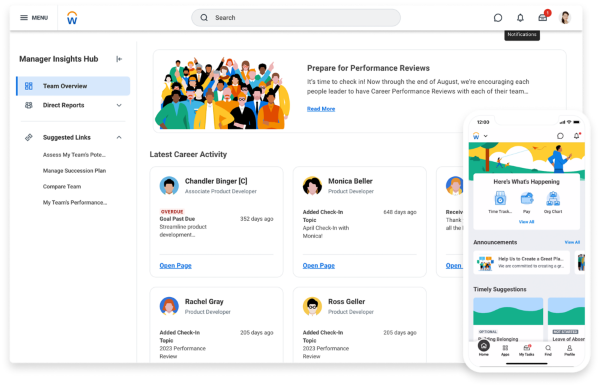
Workday’s core HR functions are particularly suited for organizations that require a scalable solution capable of handling complex HR operations across various regions and industries.
Cornerstone Core HR Functions
While Cornerstone is primarily known for its strengths in learning and talent management, it also offers solid core HR functions that are well-suited for organizations prioritizing ease of use and employee development. The platform integrates its HR functions with its broader talent management suite, creating a cohesive experience for managing employee data and HR processes.
Key Features of Cornerstone Core HR Functions:
- Integrated HR and Talent Management: Cornerstone combines core HR functions with talent management in a unified system, providing a holistic view of employee data and career progression.
- Employee Self-Service: Similar to Workday, Cornerstone offers self-service tools that allow employees to manage their information and HR tasks independently, fostering greater engagement and autonomy.
- Agile Organizational Management: The platform provides flexible tools to adapt to organizational changes, such as team restructuring or shifts in employee roles, ensuring HR processes remain agile and responsive.
- Global Capabilities: Cornerstone supports organizations with a global presence, offering features that cater to multi-country operations, although its global compliance tools may not be as extensive as Workday’s.
- User-Friendly Interface: The platform’s intuitive design makes it easy for HR teams to manage core functions without a steep learning curve, making it an ideal choice for mid-sized organizations.
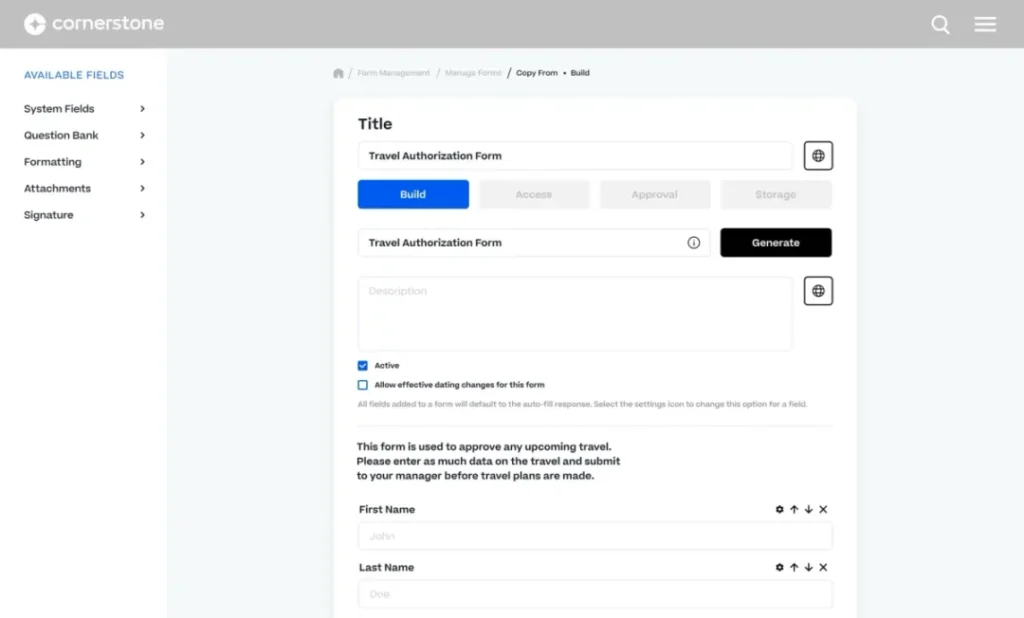
While Cornerstone’s core HR functions are designed to be straightforward and user-friendly, it is important to note that its primary strength lies in talent management rather than comprehensive HR functionalities. Organizations seeking a full suite of core HR capabilities may need to integrate Cornerstone with other systems.
Comparison and Conclusion
When comparing Workday versus Cornerstone in terms of core HR functions, it’s important to consider the specific needs and scale of your organization.
Workday excels in providing a comprehensive, integrated HR platform that is ideal for large enterprises with complex HR needs. Its global compliance features and advanced workforce analytics make it a powerful tool for managing a diverse and geographically dispersed workforce.
Cornerstone, on the other hand, offers a more streamlined approach that integrates core HR functions with its talent management suite. This makes it an excellent choice for organizations focused on employee development and seeking a user-friendly platform that simplifies HR processes.
Both platforms provide strong core HR capabilities, but the decision between Workday and Cornerstone will depend on whether your organization needs a highly scalable, globally compliant solution or a more straightforward, integrated system focused on talent management.
In summary
- Workday is suited for large enterprises requiring a comprehensive, globally compliant HR solution that integrates advanced analytics and workforce management.
- Cornerstone is ideal for organizations that prioritize ease of use and integration with talent management, offering a user-friendly platform for managing core HR functions.
Ultimately, the choice between Workday and Cornerstone for core HR functions will depend on your organization’s size, complexity, and HR priorities. By carefully evaluating these factors, you can select the platform that best supports your HR operations and contributes to the overall success of your organization.
Payroll Management
Payroll management is a critical component of any Human Capital Management (HCM) system. Ensuring accurate and timely payroll processing is essential for maintaining employee satisfaction and compliance with labor laws. In this section, we compare the payroll management capabilities of Workday versus Cornerstone to help you determine which platform best meets your organization’s needs.

Workday Payroll Management
Workday offers a robust payroll management system designed to handle complex payroll requirements for organizations of all sizes. Its payroll solution is tightly integrated with its other HR modules, ensuring seamless data flow and reducing the chances of errors.
Key Features of Workday Payroll Management:
- Global Payroll Support: Workday provides comprehensive payroll solutions that support operations in multiple countries, ensuring compliance with local regulations and labor laws.
- Real-Time Calculations: Workday’s payroll system performs real-time calculations, allowing HR teams to make immediate adjustments and see the impact instantly.
- Flexible Payroll Processing: The platform allows for various payroll cycles and off-cycle payments, providing the flexibility needed to accommodate different payroll structures.
- Self-Service Tools: Employees can access and manage their payroll information, such as viewing pay stubs, updating tax information, and tracking earnings, through an intuitive self-service portal.
- Integrated Reporting and Analytics: Workday’s payroll solution integrates with its advanced analytics tools, offering detailed reports on payroll expenses, tax liabilities, and more, helping organizations make informed financial decisions.
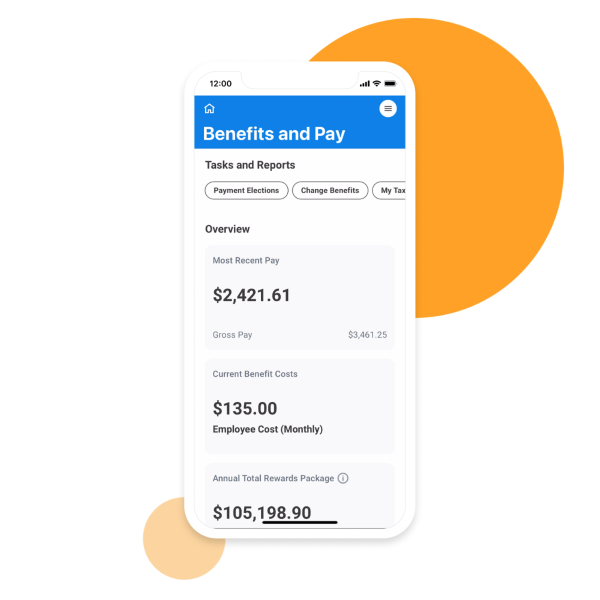
Workday’s payroll management system is particularly well-suited for organizations with complex payroll needs, especially those operating in multiple countries or regions.
Cornerstone Payroll Management
Cornerstone, while primarily known for its learning and talent management capabilities, does not offer a native payroll management system. Instead, it focuses on integrating with third-party payroll providers, allowing organizations to leverage specialized payroll solutions while maintaining a seamless HR experience.
Key Features of Cornerstone Payroll Management:
- Integration with Third-Party Payroll Providers: Cornerstone relies on external payroll systems, enabling organizations to connect their preferred payroll solutions with Cornerstone’s HR and talent management functions.
- Employee Self-Service: Similar to Workday, Cornerstone provides employees with self-service tools to access pay stubs, manage tax information, and view payroll history, though these features depend on the integrated payroll provider.
- Integrated HR Functions: Cornerstone’s payroll capabilities are integrated with its core HR and talent management functions, providing a unified experience for managing employee data.
- Basic Payroll Management Tools: For organizations with simpler payroll needs, Cornerstone offers the necessary tools to manage payroll processes effectively within the platform, but may require additional tools for more complex scenarios.
- Compliance Support: Cornerstone supports compliance with basic payroll regulations and reporting requirements through its integrations, though it may lack the depth needed for more complex global payroll needs.
Cornerstone’s payroll management approach is best suited for smaller organizations with straightforward payroll needs or those that prefer to integrate with specialized payroll providers for more complex requirements.
Comparison and Conclusion
When comparing Workday versus Cornerstone in terms of payroll management, the decision largely depends on the complexity of your organization’s payroll needs.
Workday excels with its comprehensive payroll management system, capable of handling complex, multi-country payroll processes with ease. Its real-time calculations, global compliance support, and integrated analytics make it a powerful tool for large organizations or those with diverse payroll structures.
Cornerstone, on the other hand, offers basic payroll management features through integration with third-party providers. This makes it more suited for small to mid-sized organizations with simpler payroll needs or those that prefer to use specialized payroll systems.
Both platforms offer employee self-service tools, but Workday’s more advanced features and global capabilities give it an edge for organizations with more demanding payroll requirements.
In summary
- Workday is ideal for large organizations with complex payroll needs, offering comprehensive global payroll support, real-time processing, and advanced analytics.
- Cornerstone is better suited for small to mid-sized organizations with simpler payroll needs or those that prefer to integrate with specialized payroll providers.
Ultimately, the choice between Workday and Cornerstone for payroll management will depend on the complexity of your payroll processes and your organization’s specific needs. By evaluating these factors, you can select the platform that best supports accurate, compliant, and efficient payroll operations.
Time and Attendance Tracking
Effective time and attendance tracking is essential for managing workforce productivity, ensuring accurate payroll, and maintaining compliance with labor laws. In this section, we compare the time and attendance tracking capabilities of Workday versus Cornerstone to help you determine which platform best suits your organization’s needs.

Workday Time and Attendance Tracking
Workday offers a comprehensive time and attendance tracking system that integrates seamlessly with its broader Human Capital Management (HCM) suite. The platform is designed to handle complex scheduling and time tracking requirements, making it suitable for organizations with diverse workforce needs.
Key Features of Workday Time and Attendance Tracking:
- Real-Time Data Tracking: Workday’s time tracking system provides real-time visibility into employee hours, allowing managers to monitor attendance and make adjustments as needed.
- Advanced Scheduling: The platform supports complex scheduling, including shift planning, overtime management, and flexible work arrangements, ensuring that all time-related data is accurately captured and managed.
- Mobile Accessibility: Employees can clock in and out, request time off, and view their schedules via Workday’s mobile app, providing flexibility and ease of use.
- Seamless Integration with Payroll: Workday’s time and attendance data integrates directly with its payroll system, ensuring that employees are paid accurately for the hours worked, including overtime and special pay rates.
- Compliance Management: The platform helps organizations stay compliant with labor laws by automating overtime calculations, managing break times, and providing audit trails for timekeeping records.
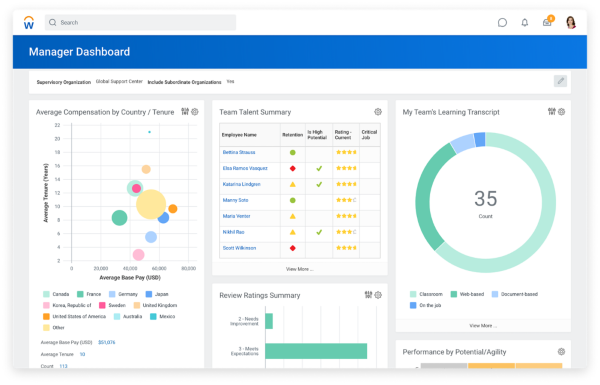
Workday’s time and attendance tracking system is particularly well-suited for large organizations or those with complex scheduling needs, offering a robust and integrated solution that ensures accuracy and compliance.
Cornerstone Time and Attendance Tracking
Cornerstone, while primarily known for its learning and talent management capabilities, does not offer native time and attendance tracking features. Instead, it focuses on integrating with third-party time and attendance solutions, allowing organizations to leverage specialized systems while maintaining a seamless HR experience.
Key Features of Cornerstone Time and Attendance Tracking:
- Integration with Third-Party Providers: Cornerstone allows organizations to connect their preferred time and attendance solutions with its HR and talent management functions, enabling a unified experience.
- Employee Self-Service: Employees can log hours worked and request time off through integrated solutions, though these features depend on the external provider.
- User-Friendly Interface: The platform’s intuitive design makes it easy for employees and managers to manage time and attendance through integrated systems.
- Mobile Capabilities: Employees can manage their time and attendance through mobile interfaces provided by third-party solutions, making it convenient for those working remotely or on the go.
- Compliance Support: Cornerstone helps organizations maintain compliance with basic labor laws through its integrations, though it may lack the depth needed for more complex timekeeping requirements.
Cornerstone’s approach to time and attendance tracking is best suited for small to mid-sized organizations with straightforward needs or those that prefer to integrate with specialized providers.
Comparison and Conclusion
When comparing Workday versus Cornerstone in terms of time and attendance tracking, the right choice depends on the complexity of your organization’s scheduling and time tracking requirements.
Workday stands out with its advanced time tracking features, including real-time data visibility, complex scheduling support, and robust compliance management. Its seamless integration with payroll and other HR functions makes it an ideal choice for larger organizations or those with intricate time tracking needs.
Cornerstone, on the other hand, offers a more basic, user-friendly approach to time and attendance tracking through integration with third-party providers. It is well-suited for small to mid-sized organizations that need straightforward time tracking capabilities without the complexity of more advanced scheduling tools.
Both platforms offer mobile accessibility and integration with payroll, but Workday’s comprehensive features provide a more powerful solution for organizations with demanding time and attendance tracking needs.
In summary
- Workday is ideal for large organizations or those with complex scheduling requirements, offering advanced time tracking, real-time data visibility, and robust compliance management.
- Cornerstone is better suited for small to mid-sized organizations that need straightforward, easy-to-use time and attendance tracking features through third-party integrations.
Ultimately, the choice between Workday and Cornerstone for time and attendance tracking will depend on your organization’s specific needs and the complexity of your timekeeping requirements. By carefully assessing these factors, you can select the platform that best supports accurate, efficient, and compliant time tracking for your workforce.
Benefits Administration
Benefits administration is a critical aspect of Human Capital Management (HCM) that directly impacts employee satisfaction and retention. Effective management of employee benefits ensures that your workforce is well-supported and that your organization remains compliant with regulatory requirements. In this section, we compare the benefits administration capabilities of Workday versus Cornerstone to help you determine which platform best meets your organization’s needs.

Workday Benefits Administration
Workday offers a comprehensive benefits administration system designed to manage a wide range of employee benefits with ease and efficiency. The platform integrates benefits management with its other HR functions, providing a unified experience that simplifies the administration process.
Key Features of Workday Benefits Administration:
- Comprehensive Benefits Management: Workday supports a wide array of benefits, including health insurance, retirement plans, flexible spending accounts, and wellness programs. This allows organizations to offer competitive benefits packages that cater to diverse employee needs.
- Automated Enrollment and Management: The platform automates the enrollment process, from initial selection to ongoing management, reducing administrative burdens and ensuring accuracy in benefits administration.
- Employee Self-Service: Employees can easily enroll in and manage their benefits through Workday’s self-service portal, providing them with visibility into their benefits options and making it easy to make changes as needed.
- Compliance and Reporting: Workday helps organizations stay compliant with regulatory requirements, offering tools for Affordable Care Act (ACA) reporting and other legal mandates. The platform also provides robust reporting capabilities, allowing HR teams to analyze benefits utilization and costs.
- Integration with Payroll: Workday’s benefits administration is seamlessly integrated with its payroll system, ensuring that deductions and contributions are accurately reflected in employee paychecks.
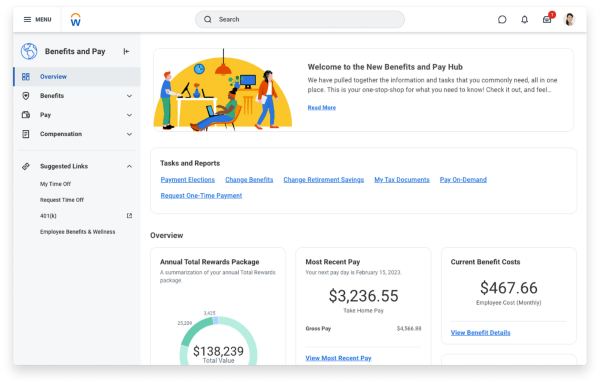
Workday’s benefits administration system is particularly well-suited for organizations with complex benefits offerings, providing a powerful and integrated solution that enhances both employee satisfaction and administrative efficiency.
Cornerstone Benefits Administration
Cornerstone primarily focuses on learning and talent management and does not offer native benefits administration features. Instead, it integrates with third-party benefits administration systems, allowing organizations to leverage specialized solutions while maintaining a seamless HR experience.
Key Features of Cornerstone Benefits Administration:
- Integration with Third-Party Providers: Cornerstone allows organizations to connect their preferred benefits administration solutions with its HR and talent management functions, enabling a unified experience.
- Employee Self-Service: Employees can view and manage their benefits through integrated solutions, although the specific features depend on the external provider.
- User-Friendly Interface: The platform’s intuitive design makes it easy for employees and managers to navigate benefits information through integrated systems.
- Compliance Support: While Cornerstone does not provide extensive benefits administration tools, it helps organizations meet basic compliance requirements related to benefits through its integrations.
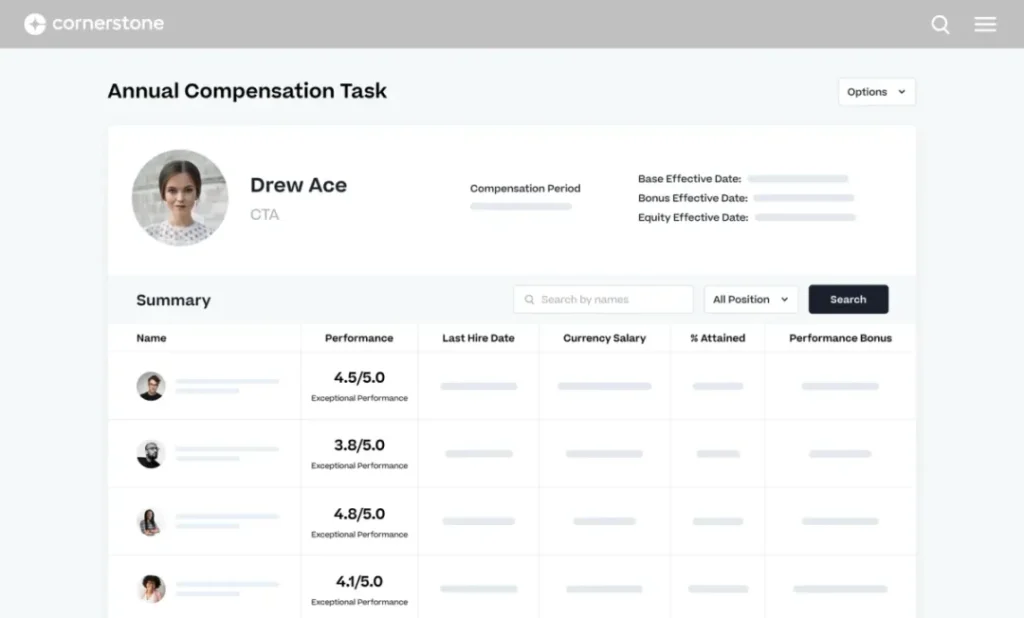
Cornerstone’s approach to benefits administration is best suited for small to mid-sized organizations that prefer to integrate with specialized providers for their benefits management needs.
Comparison and Conclusion
When comparing Workday versus Cornerstone in terms of benefits administration, the right choice depends on the complexity of your organization’s benefits offerings and administrative needs.
Workday excels in providing a comprehensive and integrated benefits administration system that supports a wide range of employee benefits. Its automated processes, compliance tools, and seamless integration with payroll make it a powerful solution for larger organizations with complex benefits programs.
Cornerstone, on the other hand, offers a more basic approach to benefits administration through integration with third-party providers. This makes it well-suited for small to mid-sized organizations with straightforward benefits needs, providing a user-friendly interface for managing employee benefits.
Both platforms offer employee self-service capabilities, but Workday’s more advanced features and extensive benefits options make it the better choice for organizations with more demanding benefits administration requirements.
In summary
- Workday is ideal for large organizations with complex benefits programs, offering comprehensive management, automated processes, and robust compliance support.
- Cornerstone is better suited for small to mid-sized organizations with straightforward benefits needs, providing a simple, user-friendly solution through third-party integrations.
Ultimately, the choice between Workday and Cornerstone for benefits administration will depend on the complexity of your benefits offerings and your organization’s specific needs. By evaluating these factors, you can select the platform that best supports effective and compliant benefits management for your workforce.
Performance Management
Performance management is a crucial component of Human Capital Management (HCM), as it helps organizations align employee goals with business objectives, foster continuous improvement, and drive overall productivity. In this section, we compare the performance management capabilities of Workday versus Cornerstone to help you determine which platform best meets your organization’s needs.

Workday Performance Management
Workday offers a robust performance management system designed to support continuous feedback, goal alignment, and employee development. The platform integrates performance management with its other HR functions, providing a unified approach that enhances the overall employee experience and organizational effectiveness.
Key Features of Workday Performance Management:
- Continuous Feedback: Workday enables ongoing performance discussions between employees and managers, promoting a culture of continuous improvement. This feature allows for real-time feedback, helping employees stay aligned with organizational goals throughout the year.
- Goal Setting and Alignment: The platform supports the setting, tracking, and alignment of individual and organizational goals, ensuring that employees’ objectives are in line with the broader strategic priorities of the organization.
- Performance Reviews: Workday offers flexible performance review processes that can be customized to fit the needs of the organization, whether through traditional annual reviews or more frequent check-ins.
- Talent Management Integration: Workday’s performance management system is fully integrated with its talent management features, including learning and development. This allows for a holistic approach to employee growth and career progression.
- Analytics and Reporting: The platform provides advanced analytics and reporting tools that offer insights into performance trends, helping HR teams make data-driven decisions about talent management and employee development.
- Mobile Accessibility: Employees and managers can access performance management tools via mobile devices, ensuring that feedback and performance discussions can occur anytime and anywhere.
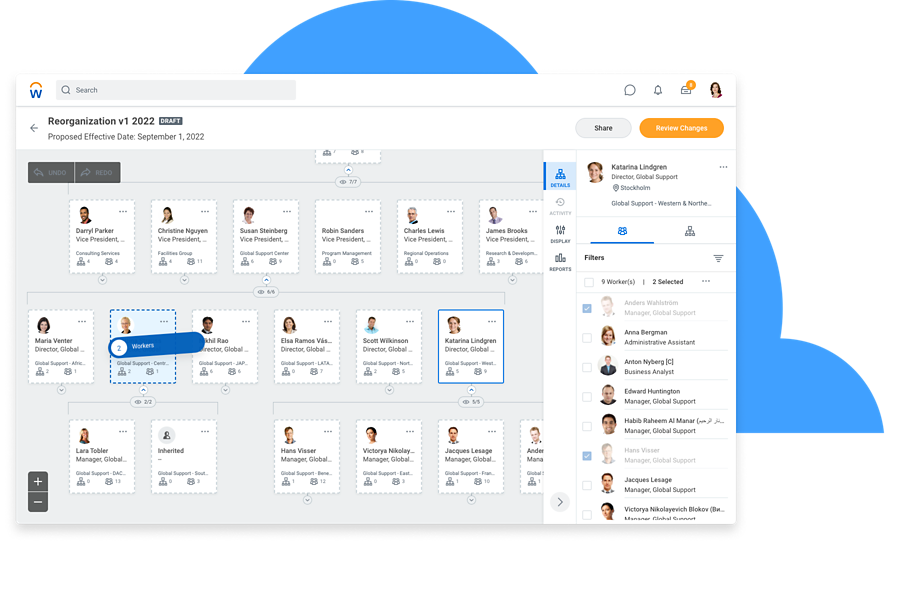
Workday’s performance management system is particularly well-suited for organizations that require a comprehensive and integrated approach to managing employee performance, with a strong emphasis on continuous feedback and goal alignment.
Cornerstone Performance Management
Cornerstone, widely recognized for its strengths in learning and talent management, also offers a performance management system designed to be user-friendly and effective for organizations of various sizes. The platform focuses on simplicity and engagement, making it easy for managers and employees to participate in the performance management process.
Key Features of Cornerstone Performance Management:
- User-Friendly Interface: Cornerstone’s performance management tools are designed with ease of use in mind, ensuring that employees and managers can easily navigate the system and complete performance-related tasks.
- Goal Setting and Tracking: Similar to Workday, Cornerstone allows for the setting and tracking of individual and team goals, helping employees stay aligned with organizational objectives.
- Continuous Feedback: The platform supports continuous feedback and check-ins, enabling ongoing performance discussions that contribute to employee development and engagement.
- Integrated Talent Management: Cornerstone’s performance management is integrated with its broader talent management suite, allowing for a seamless approach to managing employee performance and development.
- Customizable Review Processes: The system offers flexibility in designing performance review processes to meet the specific needs and culture of the organization.
- Check-Ins Feature: Cornerstone includes a “Check-ins” feature that facilitates ongoing performance conversations between employees and managers, fostering a culture of continuous improvement.
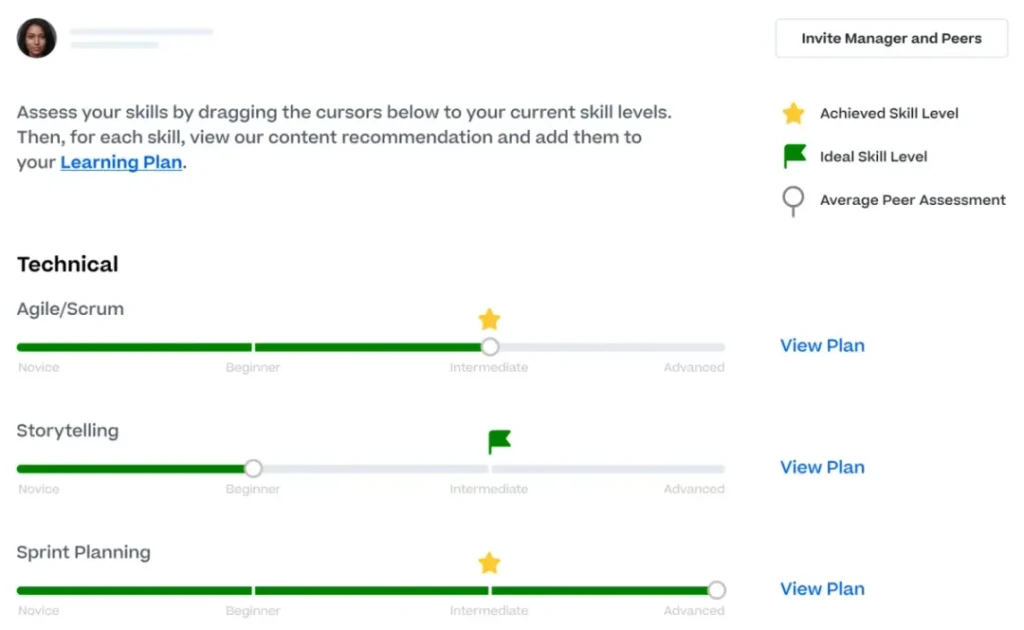
Cornerstone’s performance management system is ideal for organizations that prioritize simplicity and user engagement, offering a straightforward solution that integrates well with other HR and talent management functions.
Comparison and Conclusion
When comparing Workday versus Cornerstone in terms of performance management, the decision depends on the specific needs and size of your organization.
Workday excels with its comprehensive performance management system, which integrates continuous feedback, goal alignment, and talent management into a unified platform. Its advanced analytics and customizable review processes make it a powerful tool for large organizations or those that require a more structured approach to performance management.
Cornerstone, on the other hand, offers a more straightforward and user-friendly performance management system that is well-suited for organizations of various sizes. Its focus on simplicity and engagement, along with its integration with talent management, makes it an excellent choice for organizations looking to foster continuous improvement without the complexity of a more advanced system.
Both platforms offer strong performance management capabilities, but Workday’s more extensive features and integration with other HR functions provide a more comprehensive solution for organizations with complex performance management needs.
In summary
- Workday is ideal for large organizations or those that require a comprehensive, integrated performance management system that supports continuous feedback, goal alignment, and detailed analytics.
- Cornerstone is better suited for organizations that prioritize simplicity and user engagement, offering an easy-to-use, integrated approach to performance management.
Ultimately, the choice between Workday and Cornerstone for performance management will depend on your organization’s specific needs, the complexity of your performance management processes, and your goals for employee development and engagement. By evaluating these factors, you can select the platform that best supports effective performance management and drives your organization’s success.
Talent Management and Recruiting
Talent management and recruiting are critical components of Human Capital Management (HCM) that directly influence an organization’s ability to attract, develop, and retain top talent. In this section, we compare the talent management and recruiting capabilities of Workday versus Cornerstone to help you determine which platform best meets your organization’s needs.

Workday Talent Management and Recruiting
Workday provides a comprehensive talent management and recruiting solution designed to streamline the entire employee lifecycle, from attracting top candidates to developing and retaining key talent. The platform’s robust features ensure that organizations can effectively manage their talent pipelines and support employee growth.
Key Features of Workday Talent Management and Recruiting:
- Integrated Recruiting Module: Workday’s recruiting solution is fully integrated with its broader HCM suite, enabling seamless management of the entire recruitment process from job postings to candidate selection.
- Advanced Candidate Sourcing: Workday offers tools to source candidates from various channels, including job boards, social media, and employee referrals, helping organizations attract a diverse pool of talent.
- Applicant Tracking System (ATS): The platform provides a powerful ATS that helps HR teams manage candidate pipelines, schedule interviews, and collaborate on hiring decisions, all within a single system.
- Onboarding: Workday’s onboarding tools ensure that new hires are quickly integrated into the organization, with personalized onboarding experiences that align with company culture and values.
- Succession Planning: The platform supports succession planning by identifying high-potential employees and preparing them for future leadership roles, ensuring long-term organizational stability.
- Employee Development: Workday’s talent management features include performance reviews, learning and development programs, and career pathing, all aimed at fostering employee growth and retention.
- Skills Cloud and Opportunity Graph: Workday utilizes its Skills Cloud to help organizations understand and leverage workforce skills, while the Opportunity Graph assists employees in visualizing potential career paths within the organization.
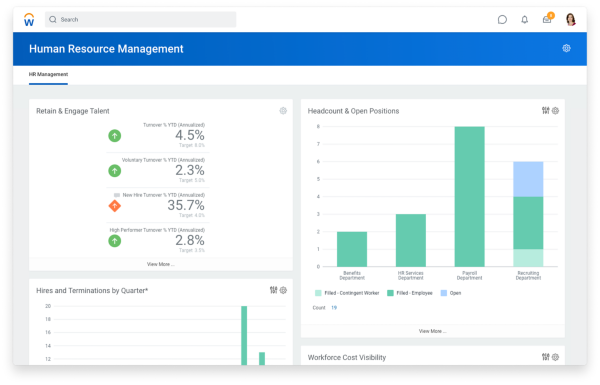
Workday’s talent management and recruiting solution is particularly well-suited for organizations that need a comprehensive, end-to-end system to manage the entire employee lifecycle, from recruitment to retirement.
Cornerstone Talent Management and Recruiting
Cornerstone is widely recognized for its strengths in talent management, particularly in learning and development. The platform also offers robust recruiting features, making it a strong choice for organizations focused on attracting and developing top talent.
Key Features of Cornerstone Talent Management and Recruiting:
- Comprehensive Talent Management: Cornerstone provides a unified system that integrates recruiting with talent management, allowing organizations to seamlessly manage the entire employee journey.
- Applicant Tracking System (ATS): Cornerstone’s ATS is designed to be user-friendly and effective, helping HR teams manage candidate pipelines, track applications, and make informed hiring decisions.
- Onboarding and Training: The platform excels in onboarding, providing new hires with the training and resources they need to succeed from day one. This focus on learning ensures that employees are well-prepared and engaged.
- Learning and Development: Cornerstone is particularly strong in learning and development, offering a wide range of tools to support employee training, skills development, and career growth.
- Succession Planning: The platform includes features for identifying and developing high-potential employees, ensuring that organizations have a pipeline of talent ready to step into critical roles.
- Employee Engagement: Cornerstone emphasizes employee engagement through continuous feedback, goal setting, and development planning, helping to retain top talent and drive performance.
- Skills Graph: Cornerstone’s Skills Graph feature helps organizations identify and map employee skills, facilitating targeted development and training initiatives.
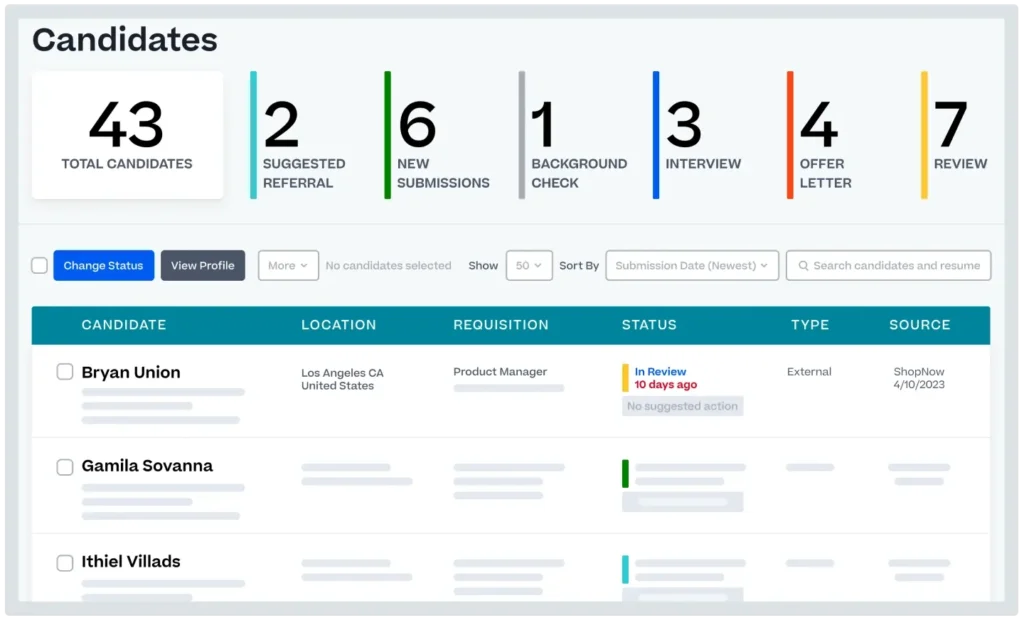
Cornerstone’s talent management and recruiting capabilities are ideal for organizations that prioritize employee development and seek a cohesive, integrated system to manage recruiting, onboarding, and talent development.
Comparison and Conclusion
When comparing Workday versus Cornerstone in terms of talent management and recruiting, the decision depends on the specific needs of your organization and its focus on different aspects of talent management.
Workday offers a comprehensive solution that covers the entire talent management spectrum, from recruiting to succession planning. Its integrated approach and advanced tools for sourcing, tracking, and developing talent make it a powerful choice for organizations with complex talent management needs.
Cornerstone, on the other hand, excels in learning and development while also providing strong recruiting features. It is particularly well-suited for organizations that prioritize employee development and engagement, offering a user-friendly system that supports the continuous growth and retention of talent.
Both platforms provide robust talent management and recruiting capabilities, but Workday’s broader focus on the entire employee lifecycle offers a more complete solution for organizations looking to manage all aspects of talent management in one place.
In summary
- Workday is ideal for organizations that require a comprehensive, integrated talent management solution that covers recruiting, onboarding, development, and succession planning.
- Cornerstone is better suited for organizations that prioritize learning and development, offering a strong, user-friendly system for managing recruiting and talent development.
Ultimately, the choice between Workday and Cornerstone for talent management and recruiting will depend on your organization’s specific goals, the complexity of your talent management processes, and your focus on employee development. By evaluating these factors, you can select the platform that best supports your talent strategy and drives organizational success.
Learning and Development
Learning and development (L&D) are critical components of Human Capital Management (HCM) that help organizations foster continuous employee growth, improve skills, and ensure that the workforce remains competitive. In this section, we compare the learning and development capabilities of Workday versus Cornerstone to help you determine which platform best meets your organization’s needs.

Workday Learning and Development
Workday offers a robust learning and development system that is integrated with its broader HCM suite, providing a unified approach to employee growth and skill development. The platform is designed to support continuous learning, enabling organizations to develop a skilled, knowledgeable workforce.
Key Features of Workday Learning and Development:
- Integrated Learning Platform: Workday’s learning management system (LMS) is fully integrated with its other HR modules, allowing for a seamless experience that connects learning with performance management and career development.
- Personalized Learning Paths: The platform supports personalized learning experiences by offering tailored learning paths based on an employee’s role, career goals, and development needs. This ensures that employees receive relevant training that aligns with their professional aspirations.
- Social and Collaborative Learning: Workday promotes collaborative learning through social features, enabling employees to learn from peers, share knowledge, and engage in interactive learning experiences.
- Mobile Learning: Workday’s mobile-friendly LMS allows employees to access learning materials on the go, ensuring that learning is flexible and accessible at any time.
- Analytics and Reporting: The platform provides advanced analytics and reporting tools to track learning progress, measure the effectiveness of training programs, and make data-driven decisions about employee development.
- Skills Cloud: Workday utilizes its Skills Cloud to help organizations understand and leverage workforce skills in relation to learning and development.
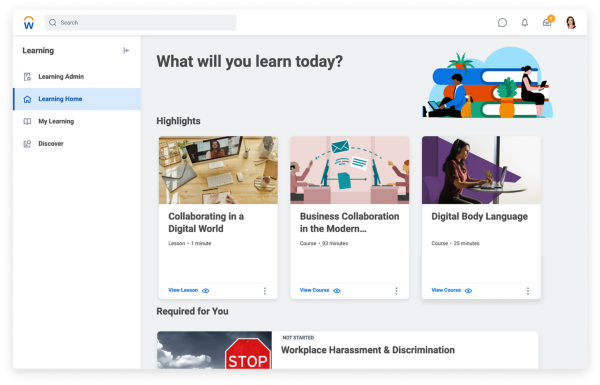
Workday’s learning and development system is particularly well-suited for organizations that require a comprehensive, integrated solution to support continuous learning and employee development across all levels.
Cornerstone Learning and Development
Cornerstone is widely recognized as a leader in learning and development, offering one of the most comprehensive and user-friendly learning management systems (LMS) available. The platform is designed to support organizations in delivering effective training and development programs that drive employee engagement and skill enhancement.
Key Features of Cornerstone Learning and Development:
- Comprehensive LMS: Cornerstone’s LMS is robust and flexible, offering a wide range of tools to create, deliver, and manage training programs tailored to the needs of the organization.
- Content Creation and Management: The platform allows organizations to create custom content, manage a vast library of learning materials, and deliver training in various formats, including video, e-learning, and in-person sessions.
- Personalized Learning Paths: Similar to Workday, Cornerstone supports personalized learning paths that cater to individual employee needs, ensuring that training is relevant and impactful.
- Blended Learning: Cornerstone offers blended learning options, combining online and offline training to create a more comprehensive learning experience.
- Advanced Reporting and Analytics: The platform provides detailed reporting and analytics tools that help organizations measure learning outcomes, track employee progress, and assess the ROI of training programs.
- Mobile Learning: Cornerstone’s mobile LMS enables employees to access training materials from anywhere, ensuring that learning is convenient and flexible.
- Content Anytime: Cornerstone offers access to a vast library of pre-curated, off-the-shelf content, enhancing the training resources available to employees.
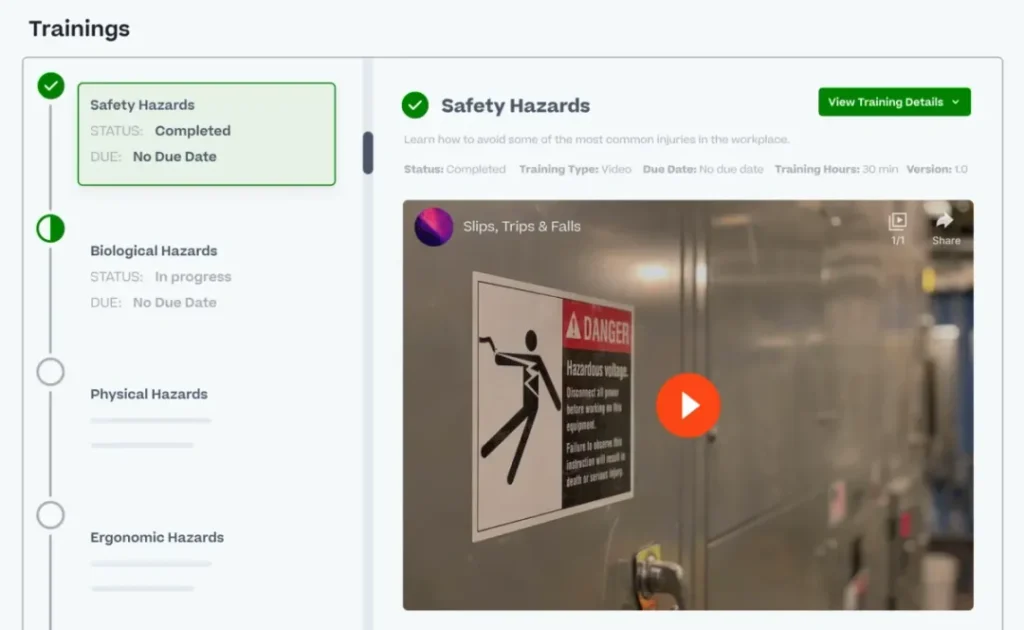
Cornerstone’s learning and development system is ideal for organizations that prioritize training and skills development, offering a powerful, user-friendly solution that supports a wide range of learning needs.
Comparison and Conclusion
When comparing Workday versus Cornerstone in terms of learning and development, the decision depends on the specific needs and priorities of your organization.
Workday offers a comprehensive, integrated learning and development system that is well-suited for organizations looking to connect learning with other HR functions, such as performance management and career development. Its focus on personalized learning paths and social learning makes it a strong choice for organizations that value continuous learning and collaboration.
Cornerstone, on the other hand, is renowned for its comprehensive and flexible LMS, making it an excellent choice for organizations that place a strong emphasis on training and development. Its robust content management features, blended learning options, and advanced reporting tools provide a powerful platform for managing diverse learning needs.
Both platforms offer mobile learning capabilities and advanced analytics, but Cornerstone’s deeper focus on learning and development makes it a preferred choice for organizations with extensive training requirements.
In summary
- Workday is ideal for organizations that require an integrated learning and development system that connects with other HR functions and supports continuous learning.
- Cornerstone is better suited for organizations that prioritize a comprehensive, flexible LMS with strong content management and reporting features, offering a powerful solution for diverse training and development needs.
Ultimately, the choice between Workday and Cornerstone for learning and development will depend on your organization’s specific goals, the complexity of your training programs, and your focus on employee growth and skills enhancement. By evaluating these factors, you can select the platform that best supports your learning and development strategy and drives organizational success.
Reporting and Analytics
In the realm of Human Capital Management (HCM), reporting and analytics are essential for understanding workforce dynamics, tracking HR metrics, and guiding strategic decisions. In this section, we compare the reporting and analytics capabilities of Workday versus Cornerstone to help you determine which platform best meets your organization’s needs.

Workday Reporting and Analytics
Workday is well-known for its powerful reporting and analytics capabilities, which are deeply integrated across all its HCM modules. The platform is designed to provide organizations with real-time insights and comprehensive data analysis, helping HR teams make informed decisions that align with business objectives.
Key Features of Workday Reporting and Analytics:
- Real-Time Data Access: Workday provides real-time access to HR data, enabling organizations to generate up-to-date reports and make timely decisions based on the latest information.
- Customizable Reports: The platform allows users to create customized reports that cater to specific organizational needs. This flexibility ensures that HR teams can analyze the data that matters most to their business.
- Dashboards and Visualizations: Workday offers interactive dashboards and visualizations that present complex data in an easy-to-understand format. These tools help HR professionals quickly grasp key metrics and trends.
- Advanced Analytics: Workday’s advanced analytics tools enable deep data analysis, including predictive analytics, which helps organizations forecast trends and make proactive decisions about workforce management.
- Integration with Other Systems: Workday’s reporting and analytics capabilities are integrated with other HR functions, such as payroll, benefits, and talent management, ensuring that all data is consistent and comprehensive.
- Prism Analytics: This feature allows organizations to combine Workday data with external data sources for more comprehensive analysis, enhancing overall reporting capabilities.
- Compliance Reporting: The platform supports compliance with various regulations by providing tools to generate required reports, helping organizations stay compliant with legal requirements.
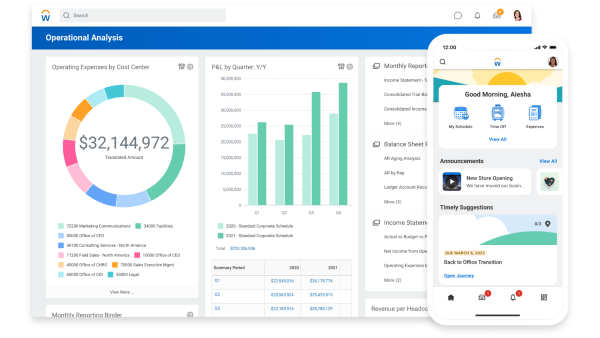
Workday’s reporting and analytics system is particularly well-suited for organizations that require real-time insights and advanced data analysis to drive strategic HR decisions.
Cornerstone Reporting and Analytics
Cornerstone offers robust reporting and analytics features that are integrated with its talent management and learning systems. The platform focuses on providing actionable insights that help organizations track employee performance, measure the effectiveness of training programs, and manage talent effectively.
Key Features of Cornerstone Reporting and Analytics:
- Customizable Reports: Cornerstone allows users to generate customizable reports that align with specific organizational goals. These reports can be tailored to provide insights into various HR metrics, including learning and development, performance, and employee engagement.
- Dashboards and Visualizations: The platform offers user-friendly dashboards and visualizations that make it easy to interpret data and identify trends. These tools are designed to help HR teams quickly understand and act on key insights.
- Learning Analytics: Cornerstone is particularly strong in learning analytics, offering detailed reports on training completion rates, learner engagement, and the impact of training on performance. This focus on learning makes it a valuable tool for organizations that prioritize employee development.
- Talent Management Integration: The platform’s analytics capabilities are integrated with its talent management functions, enabling organizations to track talent-related metrics, such as succession planning, goal achievement, and performance ratings.
- Advanced Reporting 2.0: This feature provides enhanced reporting capabilities and user-friendly report creation, making it easier for HR teams to generate insights.
- Compliance Reporting: Cornerstone supports compliance reporting by providing tools to generate necessary reports, ensuring that organizations meet regulatory requirements and maintain audit readiness.
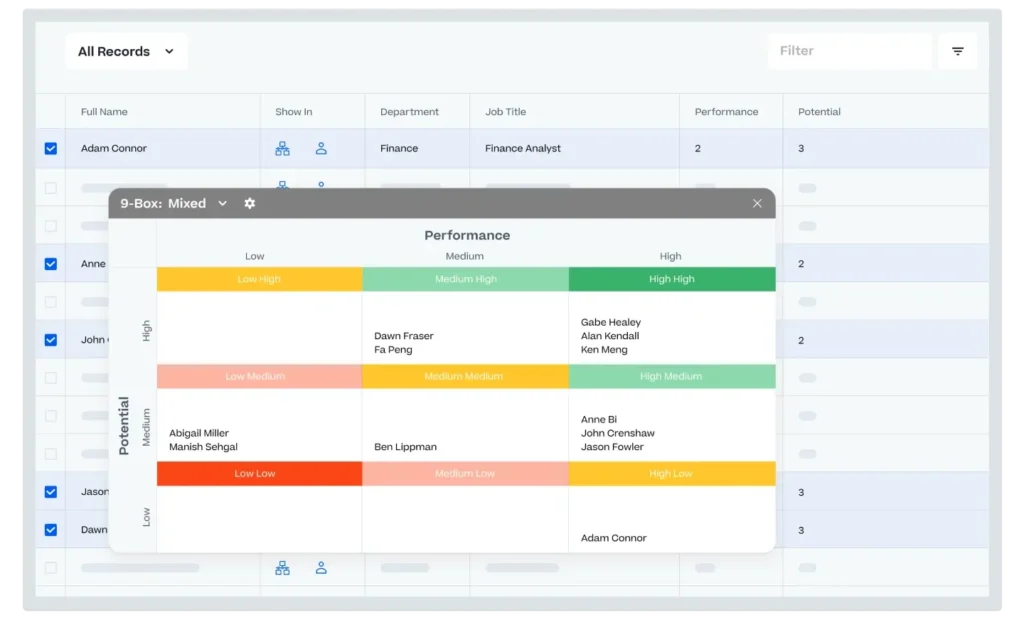
Cornerstone’s reporting and analytics system is ideal for organizations that focus on talent management and learning, offering powerful tools to measure and improve employee performance and development.
Comparison and Conclusion
When comparing Workday versus Cornerstone in terms of reporting and analytics, the decision depends on the specific needs and priorities of your organization.
Workday excels with its comprehensive, real-time reporting and advanced analytics capabilities. Its ability to integrate data across all HR functions and provide deep insights makes it a powerful tool for large organizations or those that require sophisticated data analysis to guide strategic decisions.
Cornerstone, on the other hand, offers robust reporting and analytics features with a particular strength in learning and talent management. It is well-suited for organizations that prioritize measuring and improving employee performance, training outcomes, and talent development.
Both platforms provide customizable reports, dashboards, and compliance reporting, but Workday’s broader focus on real-time data and advanced analytics gives it an edge for organizations with more complex reporting needs.
In summary
- Workday is ideal for organizations that require comprehensive, real-time reporting and advanced analytics across all HR functions, supporting strategic decision-making with deep data insights.
- Cornerstone is better suited for organizations that prioritize talent management and learning, offering robust analytics tools to measure and improve employee performance and development.
Ultimately, the choice between Workday and Cornerstone for reporting and analytics will depend on your organization’s specific goals, the complexity of your data analysis needs, and your focus on different aspects of HR management. By evaluating these factors, you can select the platform that best supports your reporting and analytics strategy and drives organizational success.
Compliance and Security
Compliance and security are critical aspects of any Human Capital Management (HCM) system, ensuring that sensitive employee data is protected and that business operations adhere to regulatory standards. In this section, we compare the compliance and security capabilities of Workday versus Cornerstone to help you determine which platform best meets your organization’s needs.

Workday Compliance and Security
Workday is well-known for its strong focus on compliance and security, providing organizations with the tools and safeguards needed to protect employee data and ensure regulatory compliance. The platform is designed to meet the needs of global organizations, offering comprehensive features that address a wide range of compliance and security requirements.
Key Features of Workday Compliance and Security:
- Data Security: Workday employs robust security measures, including AES-256 encryption for data at rest and TLS for data in transit, multi-factor authentication, and continuous monitoring to protect sensitive employee information from unauthorized access and breaches.
- Compliance Management: The platform provides comprehensive tools to help organizations comply with various regulations, including GDPR, HIPAA, and other global data protection laws. Workday’s compliance features include automated reporting, audit trails, and regulatory updates.
- Role-Based Access Control: Workday allows organizations to define role-based access controls, ensuring that only authorized personnel have access to specific data and functions within the system.
- Audit and Reporting: The platform offers detailed audit and reporting capabilities that help organizations track compliance with internal policies and external regulations.
- Data Privacy: Workday is committed to maintaining data privacy, with features designed to support data anonymization, consent management, and secure data transfers across borders.
- Power of One Security Model: This model ensures all customers benefit from the same security updates and features, maintaining a consistent security standard across all deployments.
- Key Management Service (KMS): Workday offers a Key Management Service with the option for customers to implement bring-your-own-key capability for enhanced control over data encryption.
- Compliance Certifications: Workday complies with SOC 1 and SOC 2 Type II standards, demonstrating its commitment to maintaining high security and compliance standards.
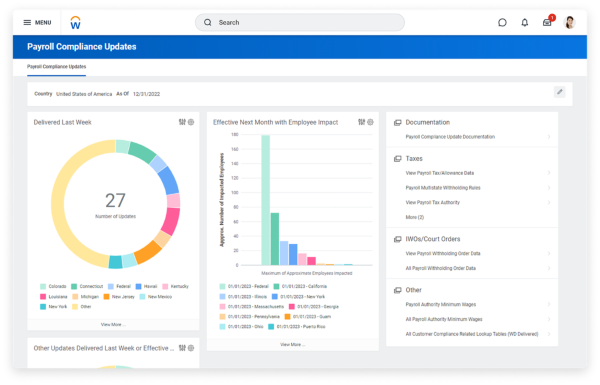
Workday’s compliance and security features are particularly well-suited for large, global organizations that need to manage complex regulatory requirements and protect sensitive employee data across multiple regions.
Cornerstone Compliance and Security
Cornerstone also places a strong emphasis on compliance and security, offering features that help organizations protect employee data and meet regulatory requirements. While Cornerstone is primarily known for its strengths in talent management and learning, it also provides robust compliance and security tools that cater to the needs of various organizations.
Key Features of Cornerstone Compliance and Security:
- Data Security: Cornerstone uses industry-standard security protocols, including encryption, secure access controls, and continuous monitoring, to safeguard employee data and prevent unauthorized access.
- Compliance Tools: The platform provides tools to help organizations comply with relevant regulations, such as GDPR and other data protection laws. Cornerstone’s compliance features include automated reporting, audit trails, and alerts for regulatory updates.
- Role-Based Access: Similar to Workday, Cornerstone allows organizations to implement role-based access controls, ensuring that only authorized users can access specific data and perform certain actions within the system.
- Audit and Reporting: Cornerstone offers comprehensive audit and reporting capabilities, allowing organizations to track compliance with both internal policies and external regulations.
- Learning Compliance: One of Cornerstone’s strengths is its focus on learning compliance, providing tools to ensure that employees complete mandatory training and certifications.
- Data Privacy: Cornerstone is committed to data privacy, offering features that support secure data handling and compliance with global data protection laws.
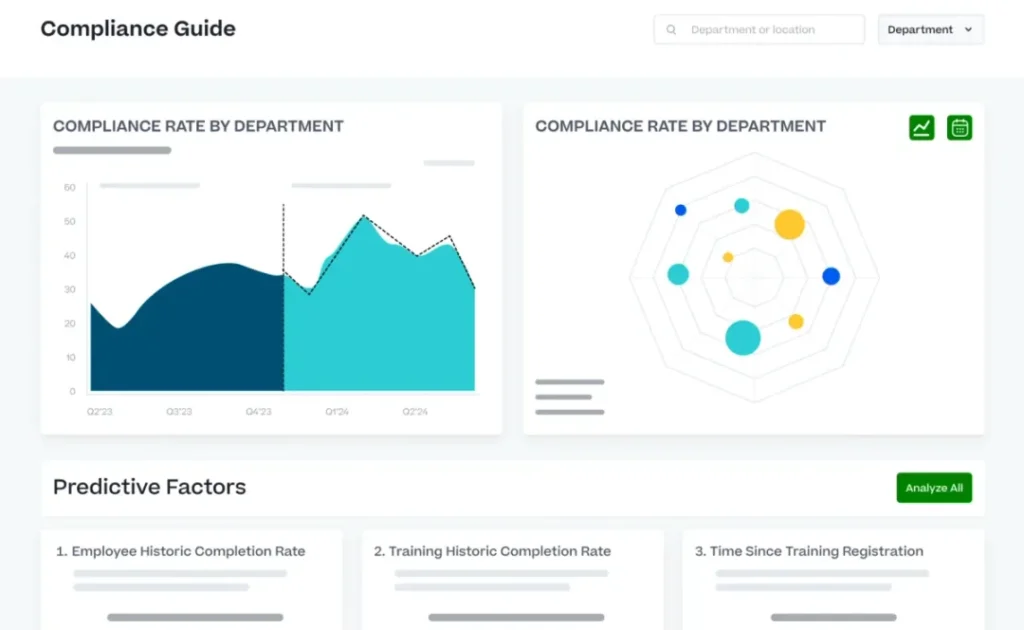
Cornerstone’s compliance and security features are well-suited for organizations that prioritize data protection and regulatory compliance, particularly those in industries where learning and certification compliance are critical.
Comparison and Conclusion
When comparing Workday versus Cornerstone in terms of compliance and security, the decision depends on the specific needs of your organization and the complexity of your compliance requirements.
Workday excels in providing a comprehensive, global compliance and security solution that is particularly well-suited for large organizations with complex regulatory requirements. Its robust security measures, role-based access controls, and detailed audit capabilities make it a powerful choice for organizations that need to protect sensitive data and ensure compliance across multiple regions.
Cornerstone, on the other hand, offers strong compliance and security features with a particular focus on learning compliance. It is ideal for organizations that prioritize data protection and need to ensure that employees meet mandatory training and certification requirements, especially in regulated industries.
Both platforms provide robust data security, role-based access, and audit capabilities, but Workday’s broader focus on global compliance and advanced security features give it an edge for organizations with more complex needs.
In summary
- Workday is ideal for large organizations with complex, global compliance and security needs, offering comprehensive tools to protect data, ensure regulatory compliance, and manage risks.
- Cornerstone is better suited for organizations that prioritize learning compliance and need robust security measures to protect employee data while ensuring adherence to training and certification requirements.
Ultimately, the choice between Workday and Cornerstone for compliance and security will depend on your organization’s specific goals, the complexity of your regulatory environment, and your focus on different aspects of data protection and compliance management. By evaluating these factors, you can select the platform that best supports your compliance and security strategy and drives organizational success.
Integration and Compatibility
Integration and compatibility are key considerations when selecting a Human Capital Management (HCM) system, as they determine how well the platform will work with your existing tools and systems. In this section, we compare the integration and compatibility capabilities of Workday versus Cornerstone to help you determine which platform best meets your organization’s needs.

Workday Integration and Compatibility
Workday is highly regarded for its integration capabilities, offering a flexible and scalable approach that allows organizations to connect Workday with a wide range of third-party applications and internal systems. This flexibility ensures that Workday can seamlessly fit into your existing technology ecosystem, supporting efficient and streamlined HR processes.
Key Features of Workday Integration and Compatibility:
- Workday Integration Cloud: Workday’s Integration Cloud is a powerful platform-as-a-service (PaaS) that allows organizations to build, deploy, and manage integrations between Workday and other systems. It supports a wide range of integration scenarios, from simple data exchange to complex business processes, with 69 million update-safe integration runs per month and a 99.7% SLA availability.
- Pre-Built Connectors: Workday offers over 600 pre-built integrations for popular third-party applications, including payroll providers, financial systems, and talent management tools. These connectors simplify the integration process and reduce the time required to get systems working together.
- APIs and Web Services: Workday provides a comprehensive set of APIs and web services that enable custom integrations with other systems. This allows organizations to tailor integrations to their specific needs, ensuring that all data flows seamlessly between systems.
- Single Sign-On (SSO): Workday supports Single Sign-On (SSO) capabilities, enabling users to access Workday and other integrated systems with a single set of credentials. This enhances security and simplifies user access management.
- Data Compatibility: Workday is designed to work with a wide range of data formats and standards, ensuring that data from different systems can be easily integrated and managed within the Workday platform.
- Mobile Integration: Workday’s mobile app integrates smoothly with other mobile and cloud-based applications, providing a consistent user experience across all devices.
- Power of One Approach: Workday’s “Power of One” approach ensures that all customers benefit from the same updates and features, maintaining consistency across integrations and functionality.
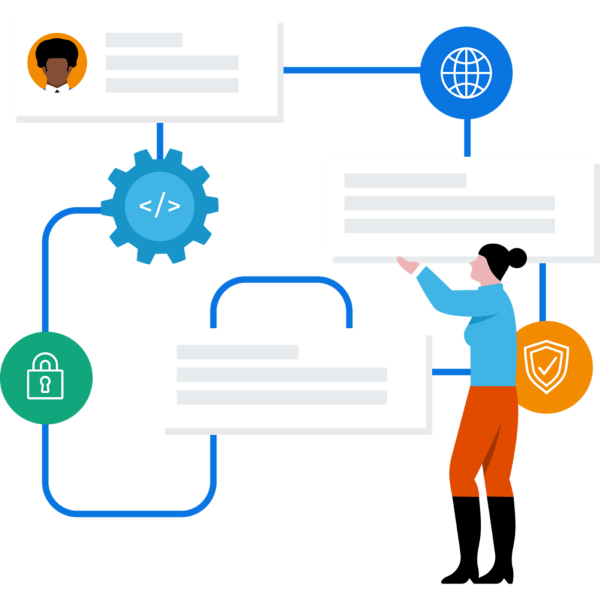
Workday’s robust integration and compatibility features make it an ideal choice for large organizations that require a high degree of flexibility and scalability in connecting various systems and applications.
Cornerstone Integration and Compatibility
Cornerstone offers integration capabilities with a particular focus on talent management and learning. The platform is designed to work well with other HR systems, enabling organizations to create a cohesive HR technology stack that supports comprehensive talent management and employee development.
Key Features of Cornerstone Integration and Compatibility:
- Integration Hub: Cornerstone provides an integration hub that offers tools and resources to connect Cornerstone with other HR and business systems. It supports various integration scenarios, helping organizations build a seamless HR ecosystem.
- Pre-Built Integrations: Cornerstone offers pre-built integrations with popular third-party applications, particularly focusing on learning content providers, payroll systems, and applicant tracking systems (ATS). These integrations make it easy to connect Cornerstone with other tools you already use.
- APIs and SDKs: Cornerstone provides APIs and software development kits (SDKs) that enable custom integrations, allowing organizations to tailor the platform to their specific needs and connect it with other internal systems.
- Single Sign-On (SSO): Like Workday, Cornerstone supports Single Sign-On (SSO), allowing users to access multiple integrated systems with a single set of login credentials, enhancing security and user convenience.
- Data Compatibility: Cornerstone is compatible with various data formats, ensuring that data can be easily exchanged between Cornerstone and other systems without compatibility issues.
- Learning Content Integration: Cornerstone excels in integrating with a wide range of learning content providers, making it a strong choice for organizations focused on employee training and development.
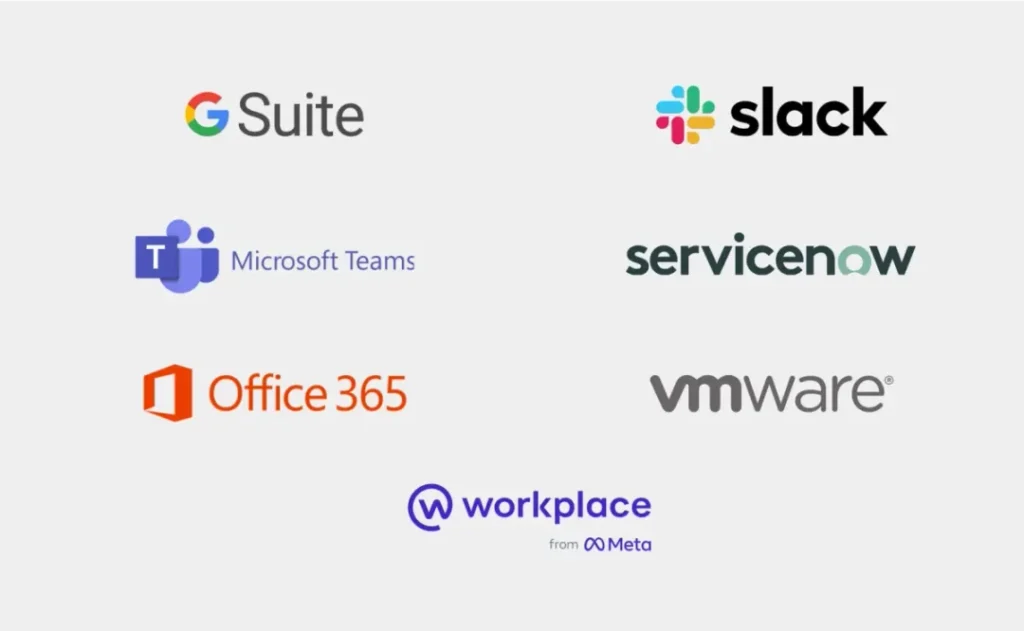
Cornerstone’s integration and compatibility features are particularly well-suited for organizations that prioritize talent management and learning, offering a flexible approach to connecting with other HR systems.
Comparison and Conclusion
When comparing Workday versus Cornerstone in terms of integration and compatibility, the decision depends on the specific needs and existing technology landscape of your organization.
Workday excels with its powerful Integration Cloud, extensive APIs, and large number of pre-built connectors, making it a top choice for large organizations that need to integrate a wide range of systems and applications. Its flexibility, scalability, and “Power of One” approach ensure that Workday can adapt to the unique integration requirements of any organization.
Cornerstone, on the other hand, offers strong integration capabilities with a focus on talent management and learning. Its pre-built integrations and developer tools make it a great choice for organizations looking to create a cohesive HR ecosystem that supports comprehensive talent and learning management.
Both platforms offer robust integration and compatibility features, but Workday’s broader focus and advanced integration tools give it an edge for organizations with complex integration needs.
In summary
- Workday is ideal for large organizations that require a flexible, scalable integration platform to connect a wide range of systems and applications, supporting a comprehensive and unified HR technology stack.
- Cornerstone is better suited for organizations that prioritize talent management and learning, offering strong integration capabilities that connect well with other HR tools and systems, particularly in the learning and development space.
Ultimately, the choice between Workday and Cornerstone for integration and compatibility will depend on your organization’s specific goals, the complexity of your existing systems, and your need for flexible and scalable integration solutions. By evaluating these factors, you can select the platform that best supports your integration strategy and ensures a seamless HR technology experience.
Customer Support and Service
Customer support and overall user experience are crucial aspects of any Human Capital Management (HCM) system. In this section, we compare Workday and Cornerstone based on user feedback and available information to help you determine which platform might better meet your organization’s needs.

Workday User Experience and Support
Workday is a comprehensive HCM platform used by many large organizations. However, user feedback suggests that there are areas where the platform could improve in terms of usability and support.
Key Points about Workday:
- Complex Interface: Some users report that Workday’s interface can be complex and not very user-friendly, particularly for employees who don’t use it frequently.
- Functionality Issues: There are reports of occasional glitches and functionality problems, which can be frustrating for users.
- Support Responsiveness: While Workday likely offers support services, user feedback suggests that responsiveness to issues could be improved.
- Integration Capabilities: Workday is known for its ability to integrate with other systems, which can be beneficial for organizations with complex HR ecosystems.
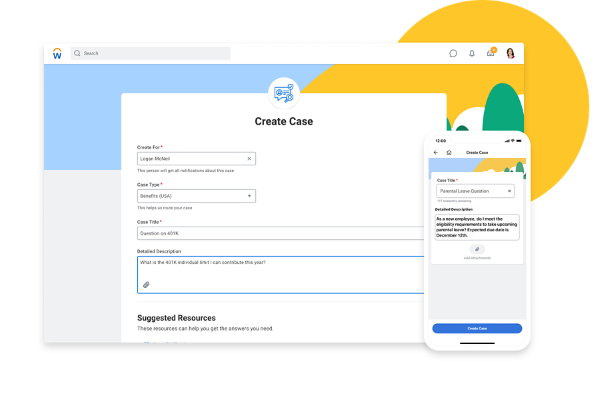
Cornerstone User Experience and Support
Cornerstone is primarily known for its learning and talent management capabilities. User feedback suggests that it generally receives more positive reviews in terms of usability and customer support.
Key Points about Cornerstone:
- User-Friendly Interface: Many users find Cornerstone’s interface to be intuitive and easy to navigate, particularly for learning management tasks.
- Strong Customer Service: Several users report positive experiences with Cornerstone’s customer service, noting that it’s responsive and helpful.
- Mobile App Challenges: Some users have reported issues with Cornerstone’s mobile app, mentioning bugs that can be frustrating.
- Customization Options: Cornerstone offers good customization capabilities, allowing organizations to tailor the platform to their specific needs.
- Learning Content Integration: Cornerstone excels in integrating with a wide range of learning content providers, making it a strong choice for organizations focused on employee training and development.
Comparison and Conclusion
When comparing Workday and Cornerstone in terms of user experience and support, the decision depends on your organization’s specific needs and priorities.
Workday appears to be a comprehensive solution that can handle complex HR processes and integrations. However, some users find it challenging to navigate and report occasional functionality issues. It might be better suited for large organizations with dedicated HR teams who can invest time in learning and optimizing the system.
Cornerstone, on the other hand, seems to offer a more user-friendly experience, particularly in learning and talent management. It receives more positive feedback regarding customer support, which could be valuable for organizations that prioritize ease of use and responsive assistance.
In summary
- Workday might be suitable for large organizations that need a comprehensive HCM solution and have the resources to manage a more complex system.
- Cornerstone could be a better fit for organizations that prioritize user-friendliness, particularly in learning and talent management, and value responsive customer support.
Ultimately, the choice between Workday and Cornerstone will depend on your organization’s specific requirements, the complexity of your HR processes, and the level of user-friendliness and support you prioritize. It’s recommended to thoroughly evaluate both platforms, possibly through trials or demos, and consider feedback from your own team members before making a decision.
Pricing and Cost-effectiveness
Pricing and cost-effectiveness are significant considerations when selecting a Human Capital Management (HCM) system. Organizations need to ensure that they are investing in a platform that not only meets their needs but also offers good value for the cost. In this section, we compare the pricing models and cost-effectiveness of Workday versus Cornerstone to help you determine which platform best fits your organization’s budget and requirements.

Workday Pricing and Cost-effectiveness
Workday is known for offering a comprehensive and feature-rich HCM platform, with a pricing model that reflects its premium positioning in the market.
Key Factors of Workday Pricing:
- All-Inclusive Pricing Structure: Workday typically offers an all-inclusive pricing model, where companies pay a single fee to access every module. This can be beneficial for organizations looking for a comprehensive solution.
- Subscription-Based Model: Workday operates on a subscription-based pricing model, where organizations pay an annual fee based on the number of employees using the system.
- Customization and Scalability: The cost of Workday can vary significantly depending on the level of customization and the scale of deployment. Larger organizations with complex needs may see higher costs due to the extensive features and customization options available.
- Implementation Costs: In addition to the subscription fee, organizations should consider implementation costs, which can be substantial for large enterprises.
- Long-Term Value: While the initial cost of Workday can be high, many organizations find that the platform’s comprehensive features, robust integrations, and continuous updates provide strong long-term value.
Workday is particularly well-suited for large organizations with complex HR needs and the budget to invest in a premium solution. However, it’s important to note that specific pricing information is not publicly available, and organizations need to contact Workday directly for a quote.
For more information about pricing, please visit Workday’s website.
Cornerstone Pricing and Cost-effectiveness
Cornerstone offers a more flexible pricing structure, making it accessible to a wider range of organizations, including small to mid-sized businesses.
Key Factors of Cornerstone Pricing:
- Modular Pricing Model: Cornerstone operates on a modular pricing model, where organizations can select specific modules based on their needs.
- User-Based Pricing: Pricing is based on the number of users, with a starting price of $6 per user per month for the Learning module. However, costs can vary depending on the modules selected and the organization’s specific requirements.
- Flexible User Management: Cornerstone offers flexibility in adding or removing users, which can be beneficial for organizations with fluctuating workforce sizes.
- Support Packages: Cornerstone provides different support packages, including Professional, Professional Plus, Premier, and Premier Plus, allowing organizations to choose the level of support that best fits their needs and budget.
- Lower Implementation Costs: Implementation costs for Cornerstone tend to be lower compared to more comprehensive platforms like Workday, particularly for organizations that opt for fewer modules or less customization.
Cornerstone’s pricing model is particularly attractive for small to mid-sized organizations or those looking for a cost-effective solution focused on specific HR functions, such as learning and performance management. As with Workday, organizations need to contact Cornerstone directly for a detailed quote.
For more information about pricing, please visit Cornerstone’s website.
Comparison and Conclusion
When comparing Workday versus Cornerstone in terms of pricing and cost-effectiveness, the right choice depends on the size, complexity, and budget of your organization.
Workday offers a comprehensive, all-inclusive solution that can be more expensive upfront but may provide long-term value for large organizations with complex HR needs. Its pricing structure is designed to cover all modules, which can be beneficial for organizations looking for a fully integrated HCM system.
Cornerstone provides a more flexible, modular approach to pricing, with a lower entry point that can be attractive to smaller organizations or those with more specific HR needs. Its per-user pricing model and ability to add or remove modules offer scalability that can grow with your organization.
Both platforms offer integration and customization options to help businesses tailor the software to their needs, which can impact the overall cost and value proposition.
In summary
- Workday is ideal for large organizations with complex HR needs and the budget to invest in a premium, all-inclusive solution. Its long-term value is realized through its comprehensive features and robust integrations.
- Cornerstone is better suited for small to mid-sized organizations or those seeking a cost-effective, modular solution focused on specific HR functions. Its flexible pricing and lower implementation costs provide strong value for organizations with more targeted needs.
Ultimately, the choice between Workday and Cornerstone for pricing and cost-effectiveness will depend on your organization’s specific budget, the complexity of your requirements, and your focus on achieving the best return on investment. Given that exact pricing is not publicly available for either platform, it’s recommended to contact both vendors directly for detailed quotes tailored to your organization’s needs.
User Reviews and Testimonials
User reviews and testimonials are valuable resources for understanding the real-world performance and satisfaction levels of Human Capital Management (HCM) systems. In this section, we compare the user reviews and testimonials for Workday versus Cornerstone to help you gauge which platform might be the best fit for your organization.

Workday User Reviews and Testimonials
Workday is a comprehensive HCM platform that is often praised for its robust features and capabilities. However, user feedback indicates that there are both strengths and areas for improvement.
Common Themes in Workday Reviews:
- Comprehensive Features: Users frequently highlight Workday’s extensive range of features, noting that it effectively covers all aspects of HR management, from payroll and benefits administration to performance management and talent development. This comprehensive approach is particularly appreciated by large organizations with complex needs.
- User-Friendly Interface: Many users describe Workday’s interface as intuitive and easy to navigate. The platform’s clean design and customizable dashboards are often cited as beneficial for user experience.
- Integration Capabilities: Workday receives commendations for its strong integration capabilities, allowing seamless connections with other systems and applications. This flexibility is a significant advantage for organizations that rely on multiple tools to manage their HR processes.
- Real-Time Data and Analytics: Users appreciate Workday’s real-time data access and advanced analytics, which enable HR teams to make informed decisions quickly. The ability to generate detailed reports and visualize key metrics in real-time is highly valued.
- Implementation Challenges: On the downside, some users mention that Workday’s implementation process can be complex and time-consuming, particularly for large enterprises. Additionally, there is a learning curve associated with the platform’s extensive features, which may require additional training for users to fully leverage its capabilities.
Overall, Workday receives strong endorsements from users who value its comprehensive features, user-friendly interface, and robust integration options. However, organizations should be prepared for a potentially complex implementation process and the need for training to maximize the platform’s benefits.
Cornerstone User Reviews and Testimonials
Cornerstone is well-regarded, particularly in the areas of talent management and learning. Users often praise Cornerstone for its ease of use, flexibility, and focus on employee development.
Common Themes in Cornerstone Reviews:
- Strong Talent Management and Learning: Cornerstone consistently receives high marks for its talent management and learning capabilities. Users appreciate the platform’s ability to deliver effective training programs, manage performance, and support employee development. This focus on learning and growth is a key differentiator for Cornerstone.
- Ease of Use: Many users describe Cornerstone as user-friendly, with an intuitive interface that simplifies navigation. The straightforward design reduces the learning curve for new users.
- Customization and Flexibility: Cornerstone’s modular approach is another highlight, allowing organizations to select and customize the features they need. This flexibility is particularly beneficial for small to mid-sized organizations that may not require the full suite of HR tools.
- Responsive Customer Support: Users commend Cornerstone’s customer support team for being responsive and helpful. The availability of resources like the Cornerstone Success Center empowers users to find answers and solutions independently.
- Room for Improvement in Reporting: Some users note that while Cornerstone’s reporting features are solid, they could be more intuitive and offer greater customization options. Additionally, there are occasional mentions of the platform’s performance slowing down when handling large datasets or complex reports.
Overall, Cornerstone is highly regarded by users who value its strengths in talent management, learning, and ease of use. The platform’s flexibility and responsive customer support are also key factors in its positive reviews. However, organizations with more complex reporting needs may find some limitations in this area.
Comparison and Conclusion
When comparing Workday versus Cornerstone based on user reviews and testimonials, both platforms receive strong endorsements, but they cater to different organizational needs and priorities.
Workday is praised for its comprehensive features, real-time analytics, and strong integration capabilities, making it an excellent choice for large organizations with complex HR requirements. Users appreciate its user-friendly interface but caution that the implementation process can be challenging and may require significant training.
Cornerstone, on the other hand, excels in talent management and learning, offering a user-friendly platform that is highly flexible and customizable. It is particularly well-suited for small to mid-sized organizations or those focused on employee development. Users appreciate the responsive customer support but note that reporting could be more intuitive.
In summary
- Workday is ideal for large organizations that need a comprehensive, feature-rich HCM platform with strong integration capabilities and real-time data analytics. While the platform receives high praise, organizations should be prepared for a more involved implementation process.
- Cornerstone is better suited for organizations focused on talent management and learning, offering a flexible, user-friendly platform with excellent customer support. It is particularly effective for small to mid-sized organizations, though reporting features may require improvement for more complex needs.
Ultimately, the choice between Workday and Cornerstone based on user reviews and testimonials will depend on your organization’s specific goals, the complexity of your HR processes, and your focus on areas such as learning and development versus comprehensive HR management. By considering these factors and the experiences of other users, you can select the platform that best aligns with your needs and expectations.
Conclusion
Choosing between Workday and Cornerstone as your Human Capital Management (HCM) solution ultimately depends on the specific needs and priorities of your organization. Both platforms are powerful, well-regarded tools, but they cater to different aspects of HR management and offer unique strengths.
Workday
Workday stands out as a comprehensive, all-in-one HCM solution, particularly well-suited for large organizations with complex HR needs. Its strengths lie in its extensive range of features, including advanced payroll management, robust time and attendance tracking, and sophisticated reporting and analytics. Workday also excels in providing strong integration capabilities, ensuring that it can seamlessly connect with other systems and tools within your organization. However, its premium pricing, potentially complex implementation process, and the learning curve associated with its extensive features should be considered. Workday has an overall rating of 8.6, reflecting its strong reputation in the market.
Cornerstone
On the other hand, Cornerstone is a leader in talent management and learning, offering a user-friendly, modular approach that is highly adaptable to the needs of small to mid-sized organizations. Cornerstone’s focus on employee development, combined with its flexibility and responsive customer support, makes it an ideal choice for organizations that prioritize learning and performance management. While it may not offer the same breadth of features as Workday, Cornerstone provides excellent value for organizations looking to enhance their talent management and learning strategies without a significant financial commitment. Cornerstone has an overall rating of 8.2, indicating solid user satisfaction.
In summary
- Workday is ideal for large enterprises requiring a comprehensive, scalable HCM platform with a wide range of features that support complex HR operations across global locations.
- Cornerstone is better suited for organizations that prioritize talent management and learning, offering a flexible, user-friendly platform that is particularly effective for small to mid-sized businesses.
Ultimately, the decision between Workday and Cornerstone should be based on your organization’s specific goals, budget, and HR priorities. By carefully considering the strengths and limitations of each platform, as well as insights from user reviews and testimonials, you can select the HCM solution that best aligns with your strategic objectives and drives the success of your workforce.
![]()
![]() Read our full Workday review
Read our full Workday review
![]()
![]() Read our full Cornerstone review
Read our full Cornerstone review

